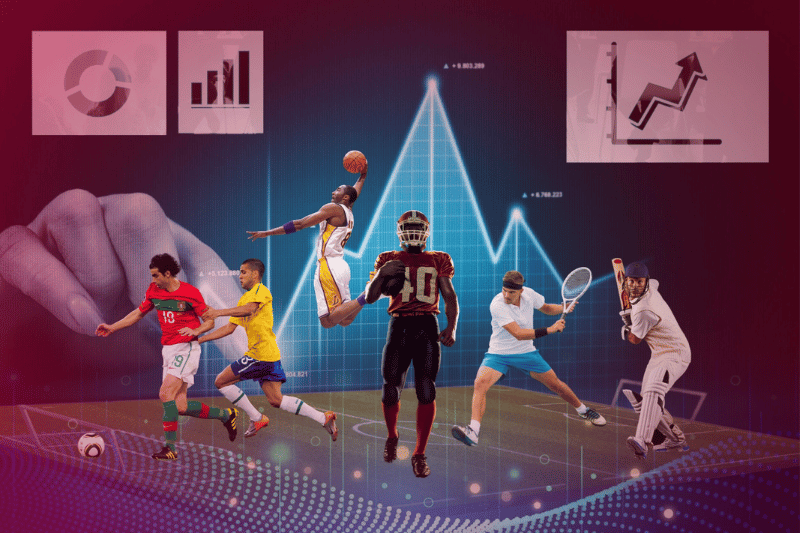
Sports teams are now moving far beyond traditional sabermetrics and game performance thanks to data analysis. It is anticipated that the market for data analytics in sports will have grown to over $4 billion due to the fact that it benefits numerous sports organizations in numerous ways. Teams and organizations may track performance with Big Data Analytics, predict outcomes, and make more informed choices on the field. Want to know which play to use in a football game on fourth down? Analyze the data. Are you debating whether your pitcher should go for one more inning? Analyze the data. Even though players still win games, data enables coaches to position their players for success.
The way sports fans watch their favourite teams has also incorporated analytics. Off the field, analysts, commentators, and fans frequently use data to explain play-by-play, discuss project ions, or influence fantasy league selections. Coaches and front offices held data analysts at a distance for a very long time. But today, adding data analysts to sports staff is commonplace. The importance of sports data analytics seems to be increasing as players and coaches look for whatever statistical advantage they can get.
ions, or influence fantasy league selections. Coaches and front offices held data analysts at a distance for a very long time. But today, adding data analysts to sports staff is commonplace. The importance of sports data analytics seems to be increasing as players and coaches look for whatever statistical advantage they can get.
What is Sports Analytics?
The technique of incorporating statistics into mathematical models to forecast the outcome of a certain play or game is known as sports analytics. While front offices utilize analytics to emphasize player development, coaches rely on it to research opponents and maximize play calls in games. Off the field, analytics play a significant role by giving fans information about fantasy sports and sports betting.
Along with professional teams, bettors and fans have also gotten involved. Data is used by sports betting analytics firms to calculate the likelihood that a particular game outcome will occur. Then, when placing bets, choosing players for a fantasy team, and making other decisions based on statistical information, fans take these odds into account.
Growing Sports Analytics
Data and sports have long been closely related. Radio broadcasters have historically used data to offer context to their commentary, such as the average number of yards a running back has gained in each game they've played, just as newspapers print box scores and baseball cards display a player's career stats.
Players are assessed by general managers and coaches using a combination of stats, such as points, batting average, or yards threw (depending on the sport), and a subjective gut feeling, such as "This player is due for a hit." Beyond those superficial statistics, however, further data analysis is typ ically resisted by both coaches and athletes. But early statisticians like Bill James began using data in the 1980s to refute those irrational presumptions. In a book titled The Bill James Historical Baseball Abstract, James made public the Sabermetrics mathematical system he developed to rate baseball players.
ically resisted by both coaches and athletes. But early statisticians like Bill James began using data in the 1980s to refute those irrational presumptions. In a book titled The Bill James Historical Baseball Abstract, James made public the Sabermetrics mathematical system he developed to rate baseball players.
Numerous clubs also use IoT (Internet of Things) technology to improve the fan experience. IoT technologies make it easy to connect objects to the internet with only a few clicks. Businesses can use big data to do in-depth research on the popular merchandise in the stadium, even paying attention to specifics like the size and colour of various clothing merchandise, so they are aware of the items in high demand and can ensure they are accessible in sufficient quantity. Identifying which games are more likely to sell out soon and encouraging recurring ticket buyers to act promptly to prevent missing the games they have shown interest in is another method to leverage big data to improve the fan experience.
When it comes to providing play-by-play updates or discussing projections, big data has had an astonishing impact not only on the sports industry's playing fields, but also among commentators, analysts, and fans. Big data in sports can be used by organizations and teams to monitor performance, generate forecasts, and be tenacious in the sports field. As a result, it is simple to understand how it has permanently altered and improved the sports sector. Sporting events could be transformed by data analytics, as demonstrated by the way we evaluate an athlete's performance by generating priceless insights. With Data Sports Group, you can do it all and more. Contact us for more information and to gain access to live sports scores right away.










